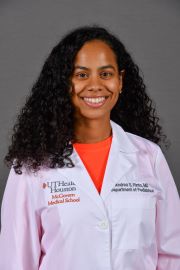Pediatric residents earn AAP Grant
The Section on Pediatric Trainees of the American Academy of Pediatrics has selected Alexandria Laws, MD, PGY-2, and Andrea Pinto, MD, PGY-2, from the Department of Pediatrics as recipients of SOPT Community Access to Child Health Resident Grant.

The Community Access to Child Health Resident or C.A.T.C.H Grant supports pediatric residents in the planning and/or implementation of community-based child health initiatives. Grants of up to $2,000 are awarded annually on a competitive basis for pediatric residents to address the needs of the underserved children in their communities.
The project, titled “Increasing Awareness and Eliminating Physician Bias of Incarcerated Youth” consists of two pillars. The first will consist of hands-on activities to help residents recognize implicit biases and how they may impact patient care and lectures presented by pediatric specialists within their fields, families whose children have experienced trauma and community leaders.
“We hope that residents will learn effective ways to care for pediatric residents who have toxic stress and traumatic histories,” the researchers said.

The second phase of the project will allow interested residents to volunteer as mentors at the Juvenile Detention Center. Volunteers will host monthly sessions for the youth at the center consisting of “Doc Talks” that cover financial and emotional literacy, resource connection, family connection, and job/school re-entrance.
“Our project was developed based on our personal experience and familiarity with the limited freedoms and safe spaces for minority youth to navigate life,” Laws and Pinto said. “A children’s provider should be a safe space. As residents, we care for youth at the JDC and minority youth are the vast majority of the population we serve. We noticed the majority of our residents were ill-prepared to care for youth with traumatic histories. Our goal was to create a project to give growing pediatricians the tools to recognize our patients’ traumas, adjust our treatment plans to fit the patient, and acknowledge how our personal biases could impact patient care.”
Phase one of the project began in August and will run through October 2024. The second phase will commence in January 2025 and conclude in June 2025.
The SOPT Health Equity Grant Program offers grants to trainees to support and prioritize research, intervention, and education within communities and institutes addressing disparities and inequities in healthcare.